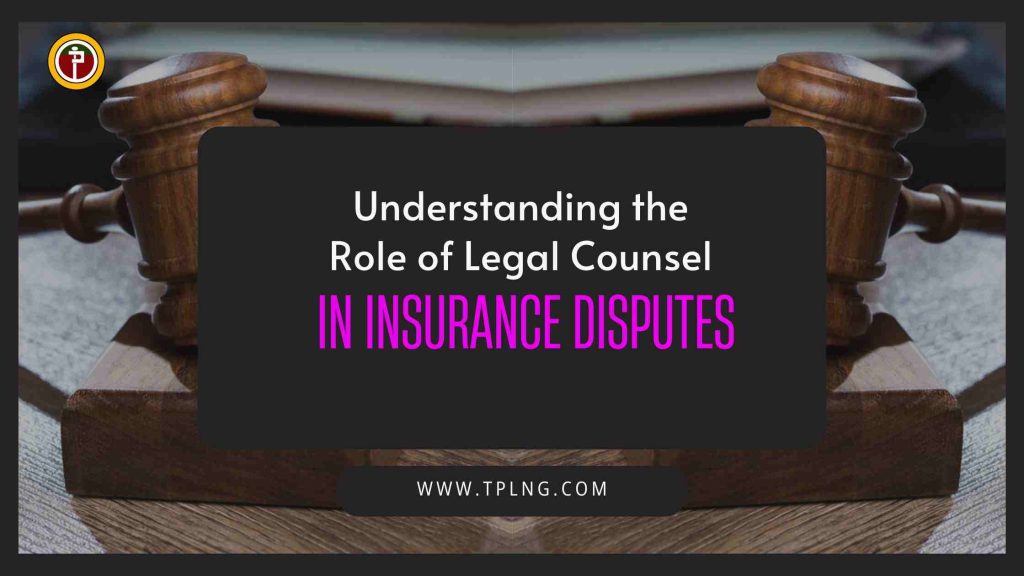Insurance disputes can arise in various forms, ranging from claims rejections to disagreements over policy interpretations. When these conflicts occur, policyholders often find themselves navigating complex legal frameworks and technical insurance jargon.
In such cases, the role of legal counsel becomes crucial, acting as a mediator between the insurance company and the policyholder to ensure a fair and just resolution.
This article delves into the significant role that legal counsel plays in insurance disputes, providing a guide for both policyholders and insurers on why professional legal representation is essential.
Also read:
Debunking Common Insurance Myths
How to Effectively Handle Insurance Disputes and Complaints
Evaluating Insurance Providers: What to Look for in an Insurer
Legal Aspects of Insurance Claims: A Guide for Policyholders
1. Interpreting Policy Language
Insurance policies are legally binding contracts, and their language can often be intricate and difficult to understand for the average person. Legal counsel specializes in the interpretation of these documents, ensuring that the policyholder fully understands the scope of coverage, exclusions, and terms. In the event of a dispute, having legal counsel to interpret ambiguous or vague terms in the policy can significantly impact the outcome.
For instance, many disputes arise due to differing interpretations of policy exclusions or limits. A lawyer can provide a clear interpretation based on legal precedents and insurance laws, helping policyholders avoid pitfalls caused by misinterpretation.
2. Advising on Legal Rights
In insurance disputes, policyholders may not be fully aware of their legal rights. Insurance companies, on the other hand, often have dedicated legal teams to protect their interests. Legal counsel helps level the playing field by informing policyholders of their rights under the insurance contract and the applicable insurance regulations.
Legal counsel can advise whether the insurer is acting in bad faith, for instance, by delaying claims processing or denying legitimate claims without valid reasons. They can also explain the legal recourse available to the policyholder, whether it involves mediation, arbitration, or litigation.
3. Negotiating Settlements
Most insurance disputes are resolved through negotiations, and legal counsel plays a vital role in this process. Lawyers are skilled negotiators who can represent the interests of the policyholder or the insurer during settlement discussions.
They aim to secure the best possible outcome, ensuring that the settlement is fair and reflective of the policyholder’s entitlement under the insurance contract.
In many cases, legal counsel can help avoid costly and time-consuming litigation by facilitating a mutually agreeable settlement between the parties. Their experience in similar disputes equips them to assess the strength of the case and negotiate accordingly.
4. Litigation Support
When insurance disputes cannot be settled through negotiation or alternative dispute resolution methods, they may proceed to court. Legal counsel provides essential support during litigation by preparing and filing necessary documents, representing clients in court, and making legal arguments on behalf of the policyholder or insurer.
Litigation is a complex process that requires a deep understanding of procedural rules, evidence presentation, and persuasive argumentation. Legal counsel ensures that the case is presented in the best possible light, increasing the chances of a favorable verdict.
5. Ensuring Compliance with Regulatory Requirements
The insurance industry is heavily regulated, and disputes often involve regulatory considerations. Legal counsel helps ensure that both policyholders and insurers are compliant with relevant insurance laws and regulations. This is particularly important in cases involving regulatory breaches, where penalties can be severe.
For insurers, legal counsel can provide guidance on regulatory compliance to avoid disputes arising from breaches of industry rules. For policyholders, legal counsel can help identify instances where the insurer has violated regulations, which could strengthen the policyholder’s case.
6. Protecting Against Bad Faith Insurance Practices
“Bad faith” refers to the unfair treatment of policyholders by an insurance company, such as unjustified claim denials, delays in payment, or lowball settlements. Legal counsel plays a crucial role in identifying and combating bad faith practices.
They can file bad faith lawsuits on behalf of policyholders to recover damages and punitive awards in cases where the insurer has acted dishonestly or failed to meet its contractual obligations.
In such cases, legal counsel ensures that the policyholder is compensated not just for the original claim but also for any additional harm caused by the insurer’s bad faith conduct.
7. Guiding Alternative Dispute Resolution (ADR) Processes
Many insurance disputes are resolved through alternative dispute resolution (ADR) methods like arbitration or mediation. Legal counsel can guide policyholders and insurers through these processes, ensuring that they understand the procedures and potential outcomes.
During ADR, legal counsel prepares the necessary documentation, advocates on behalf of their client, and helps navigate the technicalities of the process. Their goal is to secure a favorable outcome without resorting to full-scale litigation, which can be more time-consuming and expensive.
8. Protecting the Policyholder’s Interests in Complex Claims
Certain insurance claims, such as those related to business interruption, environmental damage, or liability insurance, can be highly complex. Legal counsel assists in these cases by gathering and presenting the necessary evidence, working with experts, and ensuring that the insurance company honors the terms of the policy.
For policyholders with large or complicated claims, the expertise of legal counsel is invaluable. They help manage the process from start to finish, from filing the claim to pursuing legal action if necessary.
9. Providing Peace of Mind
Perhaps one of the most significant roles of legal counsel in insurance disputes is providing peace of mind to policyholders. Insurance disputes can be stressful and overwhelming, particularly for individuals or businesses facing significant financial losses.
By having legal counsel handle the dispute, policyholders can focus on recovery while knowing that their interests are being protected by a professional.
Also read:
Debunking Common Insurance Myths
How to Effectively Handle Insurance Disputes and Complaints
Evaluating Insurance Providers: What to Look for in an Insurer
Legal Aspects of Insurance Claims: A Guide for Policyholders
Benefits of Engaging Legal Counsel
- Expertise: Specialized knowledge of insurance law and regulations.
- Objectivity: Unbiased representation, ensuring fair outcomes.
- Time-Saving: Handling complex paperwork and communication.
- Stress Reduction: Managing dispute-related stress.
- Maximized Compensation: Ensuring fair settlement or award.
- Precedent Setting: Establishing legal precedents for future disputes.
Types of Insurance Disputes Requiring Legal Counsel
- Coverage Disputes: Disagreements over policy coverage.
- Claims Denial: Insurer’s refusal to pay claims.
- Underpayment: Insufficient compensation.
- Policy Cancellation: Disputes over policy termination.
- Bad Faith Insurance: Insurer’s unfair or deceptive practices.
Choosing the Right Legal Counsel
- Experience: Insurance law expertise.
- Reputation: Proven track record.
- Communication: Clear and timely updates.
- Fees: Transparent fee structures.
- Availability: Accessibility and responsiveness.
Finally, legal counsel is essential for navigating complex issues, protecting policyholders’ rights, and ensuring fair compensation in insurance disputes. By understanding the role of legal counsel, policyholders can make informed decisions and confidently navigate disputes.
At Transparent Protection Ltd, we recognize the importance of legal counsel in insurance disputes. Contact us to learn more about our insurance solutions and expert advice.
Take advantage of the next article, subscribe now!
Have questions about claim settlements or need assistance with your insurance policy? Our team is here to help! Reach out to us via email at info@tplng.com or give us a call at 0905-776-6182. We’re committed to ensuring genuine claim settlements and supporting our valued members.
TPL, your satisfaction is our priority




